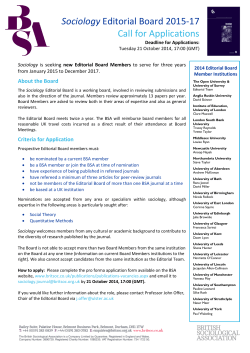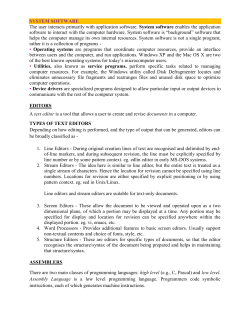
BJET Call for Editors
Editorship of the British Journal of Educational Technology (BJET) Call for proposals for the period 1st January 2016 – 31st December 2018 1. Introduction The British Journal of Educational Technology (BJET) is a journal of the British Educational Research Association (BERA) published by Wiley-Blackwell and is managed on behalf of the Association by an Editor or Editors, appointed by BERA. The Editor/s of BJET take ultimate responsibility for the content and editorial direction of the Journal. They work closely with a small group of corresponding editors who deal with specific geographical areas, an editorial board and a panel of reviewers, and an enthusiastic and effective team at Wiley. From the start of this appointment, they will also be supported by a Managing Editor provided by Wiley who will be responsible for many of the day-to-day responsibilities of editorship. More details of this role are provided later. BJET provides readers with the widest possible coverage of developments in educational technology world-wide and is the primary source for academics and professionals in the expanding fields of education, training and information technology. The Journal has a very strong citation record. It has an impact factor of 1.539 and is ranked 24th of 203 education and educational research journals. For more information, please visit the publisher’s website. http://onlinelibrary.wiley.com/journal/10.1111/(ISSN)1467-8535 Following a long and successful period as Editor-in-Chief, Nick Rushby has indicated his desire to take a step back. Exact transition arrangements will be discussed as part of the appointment process but it is important that the success of the Journal is maintained during this period of change. 2. Contract between BERA and the Editor/s of BJET BJET is managed on behalf of BERA by an Editor or Editors, appointed by BERA Academic Publications Committee, and supported by an Editorial Board. The Editors will normally be appointed for three years in the first instance but, by mutual consent, may be offered an extension of a further three year contract. There are standard Terms of Reference for the management of BERA Journals which should be read alongside this notice. The BJET Editorial Team has the following responsibilities and will maintain the aims of the journal, namely: • • • • • • • • • • • • • • • • • • • Determining editorial direction in consultation with members of the Editorial Board Determining the content of each issue; Commissioning special issues and virtual issues, appointing guest editors and working with them on those issues; International excellence; Broad intellectual remit; Broad range of methodologies; Transparent procedures for review and publication; Working with the Managing Editor to manage the flow of manuscripts. This includes reading submitted papers, assigning papers to Editors, managing the peer review process; Making and/or approving editorial decisions about rejection, revisions and acceptance including dealing with challenges from disappointed authors; Managing the Corresponding Editors, members of the Editorial Board and the reviewer panel; Writing editorials; Promoting the Journal in the UK and internationally including attending major conferences; Working with BER and the publishers to ensure the continued success of BJET; Working with APC to oversee the BJET Fellowship scheme; Reporting to BERA Academic Publications Committee (APC) and attending meetings of the Committee. Working with BERA to further the aims and activities of the Association Liaising with the editors of other journals in the field; Identifying opportunities for marketing the Journal through special issues, key papers, etc; Keeping abreast of developments in academic publishing (eg, Open Access, Publishing ethics) 3. Editorial Arrangements Editorial Team Editorial management of BJET is devolved by BERA to the Editorial Team. The Editorial Team typically consists of a group of individuals who may be based at one or at a number of higher education institutions. All members of the Editorial Team must be members of BERA for the duration of their appointment. Expenses and Funding Costs are provided to BERA by the publishers to cover expenses related to the publishing of BJET. This can cover any direct costs such as travel, meetings, secretarial, attendance at conferences to promote the Journal, postage and then any honoraria to either editors or contributors. This is administered by the BERA office and any expenses incurred by the host institutions will be reimbursed upon receipt of invoices. The total sum available in 2016 is up to £20,265 and some office expenses and travel will need to be deducted from this. However this is in addition to the provision of the Managing Editor – a detailed outline of this role can be found alongside this notice. Therefore, applicants are asked to state the level of reimbursement they think they might need and how this is broken down. A detailed MoU with the winner of the tender which confirms and clarifies terms and conditions will be drawn up in due course. Reporting The Editors report to BERA and maintains links to BERA through the BERA Academic Publications Committee. The lead Editor(s) of BJET is/are expected to attend all BERA Academic Publications Committee meetings. The Editors will produce an Annual Report on the workings of BJET. 4. Applications Applications for the Editorship should set out: • • • • • Vision for the Journal; Academic standing of the applicants; Editorial experience; Commitment to promote the Journal both in the UK and internationally; Clarity of division of responsibilities within any team. Applicants should be able to demonstrate the following characteristics: • • • • • • • • Be knowledgeable across most of the field of learning technology; Command the respect of colleagues in the field; Ideally have previous experience of editing a scholarly journal; Display attention to detail; Work to demanding deadlines; Have experience of speaking to international audiences (for whom English may not be their first language) Be encouraging to authors and sympathetic to their wants, needs and feelings (the majority of authors will have their work rejected); Commit time to continual professional development in the fields of learning technology, publishing, and working with a learned society; • • Work flexible hours, remembering that BJET attracts authors and readers across the globe, that the Corresponding Editors work in different time zones, and that the Production Department is located in Singapore. Have the full support of their institution for this role. 5. Process Proposals for the Editorship of BJET for the period 1st January 2016 to 31st December 2018 should be submitted in hard copy or by email to the BERA Executive Director: Nick Johnson BERA Executive Director Email c/o: Farzana.rahman@bera.ac.uk The deadline for receipt of proposals is 5pm on Tuesday 7th April 2015. Proposals should address the criteria listed above and be no more than 2000 words in total although publication history can be appended. Submitted proposals will be judged by a group that will include representatives drawn from BERA Council, APC and the Executive Director. All submissions will be acknowledged. If you do not receive acknowledgement of your submission within 48 hours you should resubmit your proposal as this may indicate the submission was not received. 6. Further information If you are interested in submitting a proposal and would like to discuss the matter further prior to submission then please contact Nick Johnson.
© Copyright 2025










